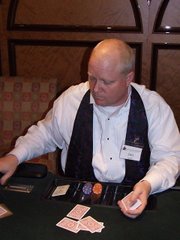 I spent the entire day in this event, another megalithic $1500 No-Limit Holdem field. I don't have any notes about specific known professionals that I may have dealt to on this day, and that isn't really too surprising. I think many of them might resign themselves to other opportunities and avoid this huge field, but its still a bracelet event.
I spent the entire day in this event, another megalithic $1500 No-Limit Holdem field. I don't have any notes about specific known professionals that I may have dealt to on this day, and that isn't really too surprising. I think many of them might resign themselves to other opportunities and avoid this huge field, but its still a bracelet event.In my opinion, the WSOP staff had made one ruling very difficult for the dealers to enforce. The cell phone rule seemed clear enough to me when the tournament started, but a few days in, it was changed slightly and we were given a bit more latitude. However, I don't think the instruction was consistently delivered, as I was hearing lots of complaints from players. Changing anything mid-stream during the series is problematic, because so many dealers are on break, have an off-day, or are otherwise missing or in-use during the dealer staff meetings and different people often give slightly different responses to questions. Anyway, we were given a pep talk about the rule and told not to let cell phone transgressions slide during the morning dealer meeting. During the tournament directors preliminary comments to the players, he seemed to emphasize the rule on cell phone usage. He said something along the lines of "if any player currently in a hand even checks a device capable of transmitting any sort of electronic message, their hand will be declared dead."
On the last hand before a player break, after a flop which 3 or 4 players saw, a bet came in early position and then a young guy behind him raised. About half the table got up and gathered their belongings to exit the player area for the break and there is often a fair share of confusion at this time. But while the original bettor was trying to decided whether or not to call, fold or re-raise, a cell phone rang, and the young guy who put in the raise, answered it and, when evidently discovering his error, looked up directly at me and said to the person "hold on, I can't talk now." I knew instantly what my decision needed to be, but I felt badly about it. I looked quickly at the other player, who now seemed ready to pounce on the mistake. I looked back at the player with the cell phone and stated that I was sorry and his hand is now dead. Then as I started to push the pot towards the other player, he started to object. Fortunately a floor person was very close, and a quick decision was made. Even though the other player had yet to make the call, his hand was the last remaining live hand with a claim to the pot. The floorman did allow the raiser to take back the portion of his bet that had not yet been called (which I think was fair, but would not have been possible if the other player had acted more quickly).
On the next day, I was assigned to the satellites section. Although you miss out on the experience of dealing varied bracelet events, this is probably the favored assignment for most of the dealers. The players are often much friendlier as they all have positive attitudes and are trying to win their way into bigger events. The stakes aren't quite as high, so bad beats are taken with much less drama. Dealing is easy, since there is no rake and because blinds are fairly fast, play usually lasts only about an hour. The staff has set up the payouts so that winners get tournament entry chips and enough cash for generous tokes, and often the players will make a deal for the chips and give most, if not all, of the cash to the dealers. If you work hard, it often seems to be recognized by the players, as you have just enough time to build a sort of reporte with the lucky winners. I managed to deal five satellites with no breaks other than the time it took between tournies to reset the chips and wait for players to be seated. I had fairly average tokes, which came to $250 for less than 7 hours, far better than I would have done on the cash tables and about the same as if I had managed 12 downs in the tournament area.







No comments:
Post a Comment